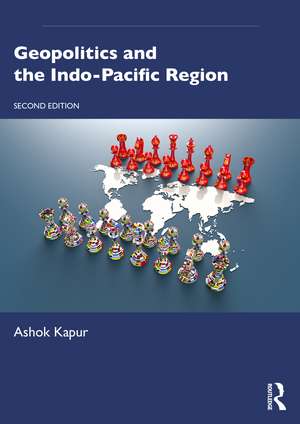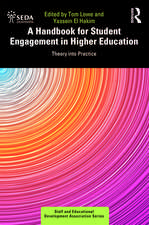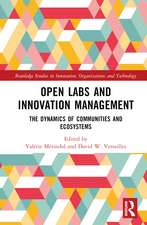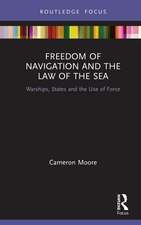Geopolitics and the Indo-Pacific Region
Autor Ashok Kapuren Limba Engleză Paperback – 27 aug 2024
The second edition has been revised, updated, and expanded to explain the major build-up of deterrence hubs during 2022–2023 in the Indo-Pacific Region (IPR). The hubs have a clear focus on North Asia (Japan and South Korea), the Taiwan Strait and Taiwan and the South China Sea (the Philippines, Vietnam, and Australia), and India and the Indian Ocean littoral areas (the Persian Gulf and the Bay of Bengal). This edition takes into account the effects of the Ukraine–Russia and Israel–Hamas/Iran proxies’ conflicts on the build-up of Russia–China–North Korea–Iran ties and the naval projections by China and Russia in North Pacific, off the Alaska coast, and in relation to Myanmar and Bangladesh and the Gulf/Red Sea areas. Within the purview of maritime security and NATO, the present century is critical with the introduction of missiles and nuclear submarine technology into IPR and by the fragmentation of arms control and nuclear and missile non-proliferation arrangements of the 1960s–2000 period. This volume predicts that China’s oft-proclaimed rise to global hegemonic status is not inevitable because of its many economic–social problems and foreign policy dilemmas. Nor is World War III inevitable because no one seeks unlimited warfare, but the regions in conflict will likely remain on a low boil. However, problem-solving and crisis resolution will remain problematic, keeping the 21st century at its toes, due to the inability of regional powers to unite for the common good.
Complete with a list of further reading, Geopolitics and the Indo-Pacific Region fills a gap in the market and will be of great interest to upper-year-level undergraduates, postgraduate students, and researchers studying international relations, IPR geopolitics, Asian politics, and Asian security studies.
| Toate formatele și edițiile | Preț | Express |
|---|---|---|
| Paperback (2) | 303.01 lei 3-5 săpt. | +19.51 lei 6-10 zile |
| Taylor & Francis – 27 aug 2024 | 303.01 lei 3-5 săpt. | +19.51 lei 6-10 zile |
| Taylor & Francis – 19 dec 2019 | 350.82 lei 6-8 săpt. | |
| Hardback (2) | 948.50 lei 6-8 săpt. | |
| Taylor & Francis – 27 aug 2024 | 948.50 lei 6-8 săpt. | |
| Taylor & Francis – 10 dec 2019 | 999.64 lei 6-8 săpt. |
Preț: 303.01 lei
Nou
Puncte Express: 455
Preț estimativ în valută:
57.99€ • 60.03$ • 49.01£
57.99€ • 60.03$ • 49.01£
Carte disponibilă
Livrare economică 12-26 februarie
Livrare express 28 ianuarie-01 februarie pentru 29.50 lei
Preluare comenzi: 021 569.72.76
Specificații
ISBN-13: 9781032709680
ISBN-10: 1032709685
Pagini: 202
Ilustrații: 6
Dimensiuni: 174 x 246 x 15 mm
Greutate: 0.37 kg
Ediția:2
Editura: Taylor & Francis
Colecția Routledge
Locul publicării:Oxford, United Kingdom
ISBN-10: 1032709685
Pagini: 202
Ilustrații: 6
Dimensiuni: 174 x 246 x 15 mm
Greutate: 0.37 kg
Ediția:2
Editura: Taylor & Francis
Colecția Routledge
Locul publicării:Oxford, United Kingdom
Public țintă
Postgraduate, Professional Reference, and Undergraduate AdvancedCuprins
List of illustrations viii Acknowledgements ix 1 Introduction 1 2 The history and parameters of the Indo-Pacific strategic region 31 3 Historical context: geopolitics and balance of power thinking and practices in Asia in the past and the present 65 4 2022–2023: old entanglements persist, new deterrence hubs emerge to check China 99 5 Power build-ups, China’s dilemmas, and intense rule resetting/rulemaking in the IPR 137 6 The anatomy of a disfunctioning system of states 160 Index 181
Notă biografică
Ashok Kapur is a distinguished professor emeritus in the Department of Political Science at the University of Waterloo, Canada. An active scholar, he has published several major works including India: From Regional to World Power (2006) and co-author of Modi’s Foreign Policy (2017).
Descriere
This textbook provides students with an introduction to the existing debates, frameworks, and issues surrounding the Indo=Pacific. It will be of great interest to upper-year level undergraduates, post graduate students and researchers studying international relations, IPR geopolitics, Asian politics, and Asian security studies.










